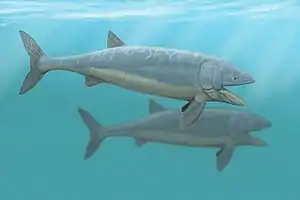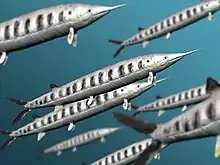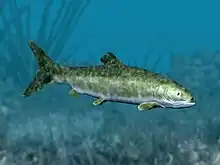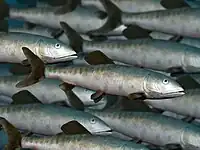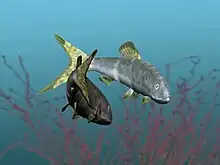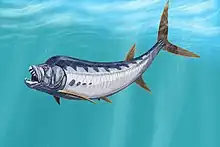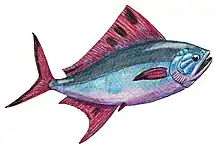Prohalecites
Prohalecites is an extinct genus of ray-finned fish from the Ladinian and possibly Carnian (Triassic) of Italy.[2] It is the oldest known teleosteomorph, a group that includes extant teleosts and their close fossil relatives.[3]
| Prohalecites Temporal range: | |
|---|---|
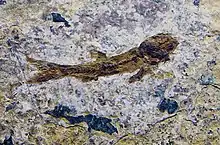 | |
| Prohalecites sp. fossil | |
| Scientific classification | |
| Domain: | Eukaryota |
| Kingdom: | Animalia |
| Phylum: | Chordata |
| Class: | Actinopterygii |
| Infraclass: | Teleostei |
| Order: | †Prohaleciteiformes Arratia, 2017[1] |
| Family: | †Prohaleciteidae Arratia, 2017[1] |
| Genus: | †Prohalecites Deecke, 1889 |
| Species: | †P. porroi |
| Binomial name | |
| †Prohalecites porroi (Bellotti, 1857) | |
The type and only known species, Prohalecites porroi, was first described as "Pholidophorus porroi" by Cristoforo Bellotti, but it was later accommodated in its own genus by Wilhelm Deecke. The species "Pholidophorus" microlepidotus has occasionally been included in this genus as well, but it differed greatly from P. porroi in several respects, indicating that it was not closely related.[2]
Species of Prohalecites are small, often measuring not more than 4 centimetres (1.6 in) in body length.[4]
See also
References
- Arratia, G. (2017). "New Triassic teleosts (Actinopterygii, Teleosteomorpha) from northern Italy and their phylogenetic relationships among the most basal teleosts". Journal of Vertebrate Paleontology. 37 (2): e1312690. Bibcode:2017JVPal..37E2690A. doi:10.1080/02724634.2017.1312690. S2CID 89773927.
- Tintori, A. (1990). "The actinopterygian fish Prohalecites from the Triassic of northern Italy" (PDF). Palaeontology. 33: 155–174.
- Arratia, G. (2015). "Complexities of early teleostei and the evolution of particular morphological structures through time". Copeia. 103 (4): 999–1025. doi:10.1643/CG-14-184. S2CID 85808890.
- Romano, Carlo; Koot, Martha B.; Kogan, Ilja; Brayard, Arnaud; Minikh, Alla V.; Brinkmann, Winand; Bucher, Hugo; Kriwet, Jürgen (February 2016). "Permian-Triassic Osteichthyes (bony fishes): diversity dynamics and body size evolution". Biological Reviews. 91 (1): 106–147. doi:10.1111/brv.12161. PMID 25431138. S2CID 5332637.
This article is issued from Wikipedia. The text is licensed under Creative Commons - Attribution - Sharealike. Additional terms may apply for the media files.
